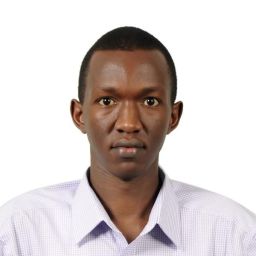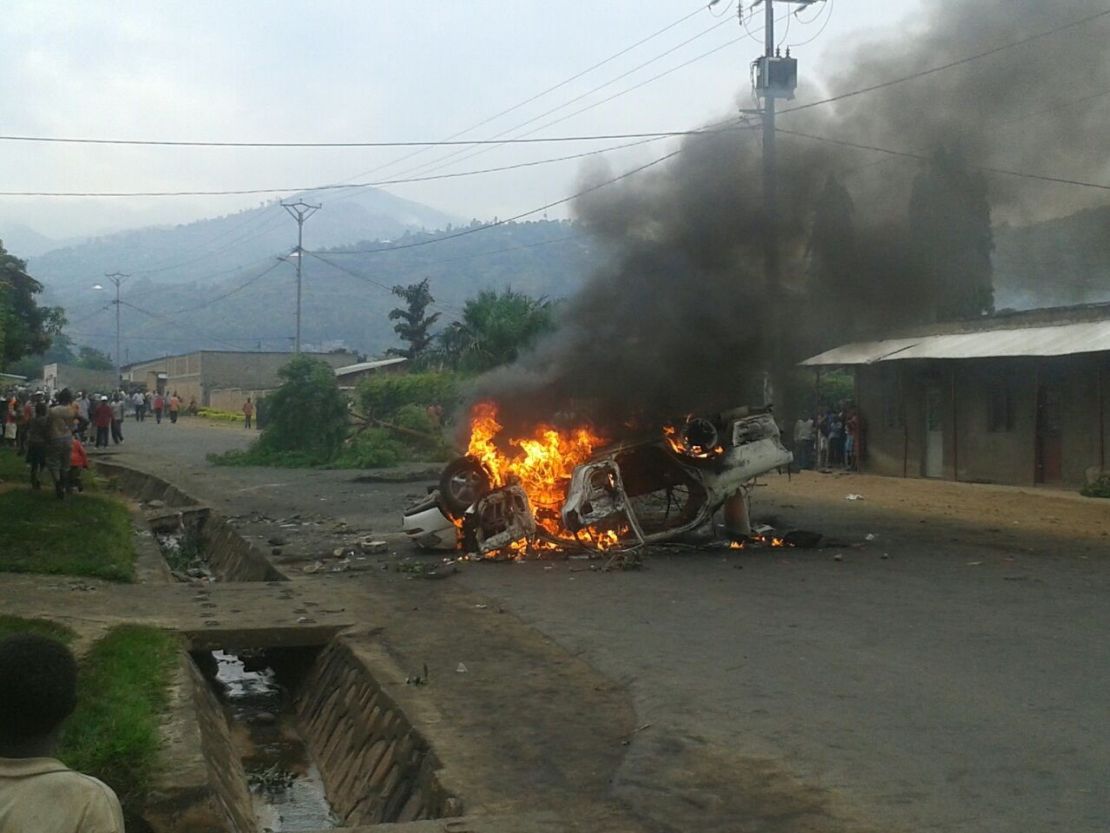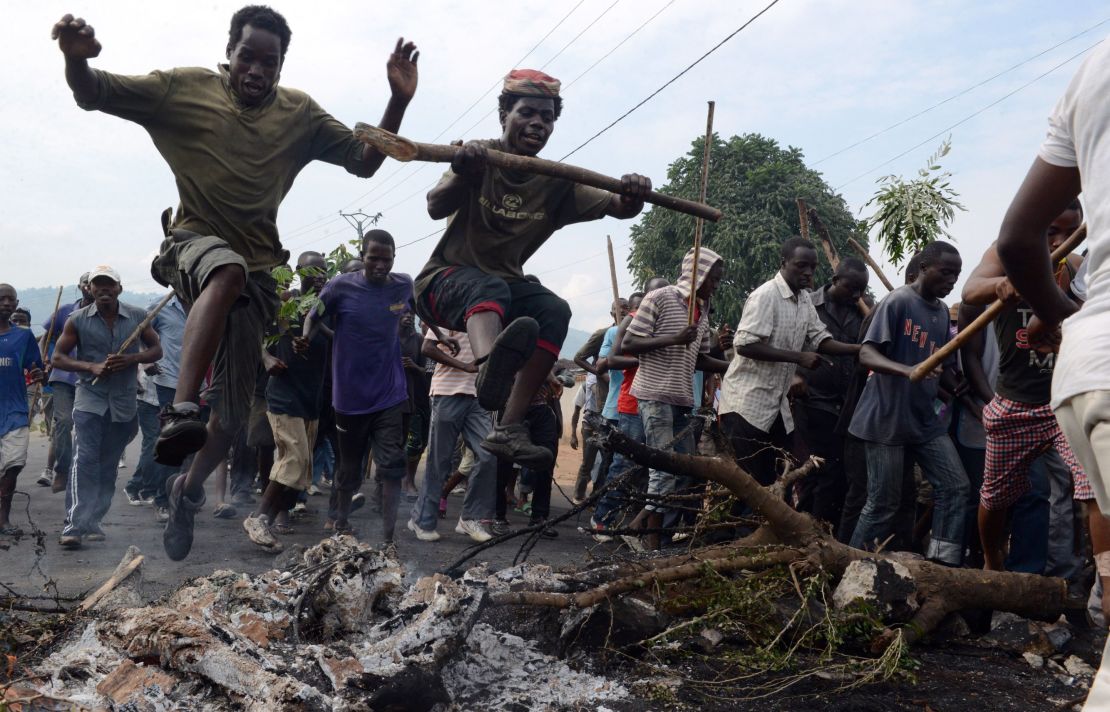Editor’s Note: Rene-Claude Niyonkuru is a researcher with a focus on policy and conflict management. He has an academic background in Law and Governance and Development and has extensively worked with/for civil society in Burundi for the last 15 years, especially for the Association for Peace and Human Rights. The expressions in this commentary are solely those of the author.
Burundians have taken to the streets from April 25, just one day after president Pierre Nkurunziza was designated by his political party CNDD-FDD to run for the 2015 presidential election. This came as no surprise, given the dubious stands expressed by official spokespersons at the president’s office.
“Now I break the silence,” the incumbent announced to an audience of 1,200 party officials. More or less 90 % of the participants had been convened to cast their votes in his favor, a decision that is seen to have the potential to put the country on the brink.
Legality vs legitimacy or none of them?
The political opposition and civil society leading figures are deeply disappointed by such a decision, which is said to be in contradiction with the content of the Constitution of Burundi. They indeed stress articles 96 and 302 of the Constitution which rule that no president will serve more than two terms in office. These two articles, a mirror-image of another disposition contained in the Arusha Peace Accord, limit the number of maximum presidential terms to two with five years each.

It seems the reason was that negotiators cocluded that 10 years were more than enough for a president to be in office. But time and again, the president’s many spokespersons had all continued to say that his decision would be taken timely.
Nkurunziza, a born-again Christian, believes he is president by the will of God, whereas a large number of citizens progressively believe he is not really up to the task, despite his popularity in rural areas.
Time has come to say no
The president and his entourage never believed that serious and lasting peaceful protests would take place. In such a regimented society, as is the case of Burundi, people hardly voice out their disgust, and the few who dare to do so are frequently harassed and arrested in both legal and illegal ways.
Nkurunziza could not imagine that the populace would scream their noisy protests in vast cohorts blocking car traffic, and decided to confront the announced ire.
However, despite a heavy presence of an angry and disproportionately equipped police, the president is being bluntly asked by the hungry, jobless and still energized mixed youth to quit.
It is new to watch both ethnic groups – Hutus and Tutsis – coming together after decades of suffering under successive regimes who apparently had only taught them to clap their hands and to vote for their fellow from same ethnic origin.
Surprisingly, Nkurunziza’s team explains this reaction as a residual reluctance from Tutsi to accept a rule of Hutu, while many international and national observers gradually find that a number of plausible sound factors are fueling this act of protestation that can even soon take place nationwide.

Lack of social and institutional capacity
Yet, the demonstrations have been foreseeable, the long-awaited outcome of the current status of a frustrated and disappointed political opposition following the many judicial decisions to disband party formations and deprive them of their true leaders.
The ruling party has also kept a watchful eye on the combatants that fought in the CNDD- FDD ranks. They are now jobless but are said to have received weapons from the Intelligence service and are instructed to fight anyone against the president’s will to stay on power.
These former combatants, with many other young party members in the Youth League, the Imbonerakure, constitute a deterrent force or a militia perceived as one of the region’s negative forces, alongside former 1994 defeated Rwandan Hutu soldiers and armed Interahamwe.
Many observers say that they have never been properly demobilized and reintegrated in civilian life. The demobilization process has been instrumental only effecting the permutation of violence.
The lack of social and institutional capacity to contend the many challenges inherent to the tricky nature of uneasy relationships governing the political system made the traditionally reserved Catholic Church to call for a no-vote situation in case Nkurunziza comes for the third time.

The role of the international community
Foreign embassies and special envoys, including from the U.S., UK, Holland and Belgium, have called to the president to withdraw his candidacy.
The U.S. considers that president Nkurunziza’s decision to run for a third term means that Burundi has lost a “historic opportunity to strengthen its democracy by establishing a tradition of peaceful democratic transition.”
Nevertheless, there is not yet a clear and definite voice that unites the international actors against Nkurunziza’s unconstitutional act which led to the alarmingly violent demonstrations.
How will, beyond the traditional diplomatic condemnation, the international community react both against the candidacy and the ongoing violent and unlawful repression targeting protesters, political opposition, media, civil society, etc. without falling into the stereotypical and paternalist discourses around international cooperation? Wait and see.
What’s next?
Scenarios about the possible evolution of the current situation vary from the least pessimistic to the worst ones.
For sure, if president Nkurunziza manages to overcome the current contestation and run the country for the coming five years or more, Burundian citizens and the international community will learn to accommodate with a more oppressive political system that will revolve around the personality and will of a single person – the president will at the same time be the head of the army, justice and intelligence service and will also have the final word both in the country’s finance and economy.
Such a scenario will put again, as well as the current unrest, the country’s fragile peace and stability at risk. Let’s, however, hope for the best; this country and its people deserve better than a stupid and costly war.
Read this: U.S. seeks to ease tensions in Burundi
The expressions in this commentary are solely those of Rene-Claude Niyonkuru.
